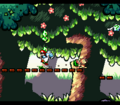Stretch (Shy Guy)
From the Super Mario Wiki, the Mario encyclopedia
Jump to navigationJump to search
| Stretch | |
|---|---|
| First appearance | Super Mario World 2: Yoshi's Island (1995) |
| Latest appearance | Yoshi's Island: Super Mario Advance 3 (2002) |
| Variant of | Shy Guy |
Stretches[1] are enemies that are encountered in Super Mario World 2: Yoshi's Island and its Game Boy Advance version. These variants of Shy-Guys are taller and thinner than ordinary Shy-Guys, with additional hair on their head. Yoshi cannot defeat them by jumping on them; instead, when jumped on, Stretches get flattened and spit out watermelon seeds. If Yoshi keeps at least one of these Shy-Guys around, he can easily take out other enemies nearby. They are very rare, and are only encountered in two levels; the latter version also includes magenta ones in Endless World of Yoshis.
Profiles and statistics[edit]
Super Mario World 2: Yoshi's Island / Yoshi's Island: Super Mario Advance 3[edit]
- Shogakukan guide: 踏むとスイカのタネを吐き出すひょうきん者。[2] (A funny guy who spits out watermelon seeds when you step on him.)
- Player's Guide: Jump or pound Stretch and he'll lay low until you step off. Then, he'll pop back into shape.[1]
- Shogakukan guide (Game Boy Advance version): ふむとスイカのタネをはき出すひょうきん者。近くに敵がいれば、このタネを当てて倒すことができるぞ。[3] (A funny guy who spits out watermelon seeds when you step on him. If there are enemies nearby, you can hit them with these seeds to defeat them.)
Gallery[edit]
Names in other languages[edit]
| Language | Name | Meaning |
|---|---|---|
| Japanese | アリホー[2][3] Arihō |
Possibly from「蟻ほぞ」(arihozo, dovetail tenon), referencing their tall and thin shape, and「ヘイホー」(Heihō, Shy Guy) |
| German | Slim Guy[citation needed] |
- |
References[edit]
- ^ a b Miller, Kent; Munson, Terry (1995). Super Mario World 2: Yoshi's Island Player's Guide. Nintendo of America (American English). Page 128.
- ^ a b 「スーパーマリオヨッシーアイランド任天堂公式ガイドブック」 (Super Mario: Yossy Island Nintendo Kōshiki Guidebook). Shogakukan (Japanese). Page 5.
- ^ a b 「スーパーマリオアドバンス3任天堂公式ガイドブック」 (Super Mario Advance 3 Nintendo Kōshiki Guidebook). Shogakukan (Japanese). Page 14.




